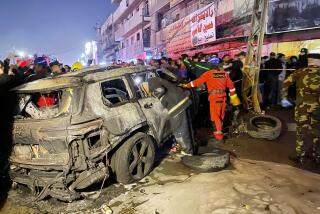Clashes continue in Iraq; at least 17 more die
BEIRUT -- Battles between Iraqi government forces and Sunni fighters left at least 17 people dead Wednesday as sectarian tensions showed little sign of abating and threatened an insurrection in Sunni provinces.
Dozens of people were reportedly killed during two days of violence that started Tuesday after Shiite-led security forces stormed a Sunni protest camp in northern Iraq. Authorities announced Wednesday that 50 people had died the previous day in Kirkuk province, home to the town of Hawija, where the bloodshed started. More died as the violence spread across the country.
Thousands of protesters, many of them chanting their opposition to Iraqi Prime Minister Nouri Maliki, attended a funeral for slain protesters in Kirkuk.
“Death for Maliki,” some chanted. “[We] will retaliate against Iran and its agents.”
Iraqis and Western diplomats had feared violence would erupt since Sunnis started protests in late December over their perceived mistreatment by Baghdad’s Shiite-dominated government. The protests brought together a combustible mix of Islamists, former insurgents, tribes and competing political camps across central and northern Iraq.
The government’s suspicions about the protesters and slow response to their demands had raised the prospect of an armed Sunni uprising. After Tuesday’s violence, it was no longer clear that such an uprising could be averted.
On Wednesday, Sunni gunmen and security forces traded fire in Suleiman Beg, outside Tuz Khurmatu in Salahuddin province, as many people abandoned the area.
Military helicopters and artillery shelled the town, a security source and local official said. Eleven people were killed there, including two soldiers, a policeman and seven civilians, and 20 others were wounded, a medical source said.
Gunmen also ambushed the Iraqi army on a road leading to Tuz Khurmatu from Diyala province to the east, leaving three soldiers dead and 11 wounded, security sources said. An additional three soldiers died in a bomb blast by the oil refinery city of Baiji, also in Salahuddin province.
In Mosul, gunmen continued to control a police station and to fire on security forces in four neighborhoods despite a curfew, security sources said.
Protesters from Fallouja in Anbar province issued a statement warning that the army and national police needed to leave their cities within 48 hours starting Tuesday, ”and if they will not respond, then we are not responsible for their safety.”
Three humvees were burned, and three others were seized by a band of gunmen in Ramadi, and an army base outside Ramadi was hit by mortar rounds, said Sheik Abdel Razzaq Suleiman, a tribal leader from the city.
Fighters also announced the formation of a special tribal army to defend Anbar province, he said.
Adding to the tensions, a bomb exploded in Husseiniya, a Baghdad Shiite neighborhood, killing seven people, security sources said.
There were no signs of a political breakthrough. A committee formed by Maliki to investigate the incident in Hawija made recommendations to compensate the victims, provide medical treatment and determine whether security commanders were negligent.
But a senior tribal leader in Anbar province, Ahmed abu Risha, whose family started the Sunni tribal revolt against Al Qaeda in late 2006, lashed out at the prime minister.
“Maliki should be prosecuted like Saddam Hussein for what he does to the people,” he said late Tuesday.
ALSO:
Kerry: Progress, no breakthrough in Afghan-Pakistani talks
Activists: Bangladesh workers told to enter building before collapse
Hagel calls claims of Syrian chemical weapons use only ‘suspicions’
Two special correspondents in Baghdad contributed to this report.
More to Read
Start your day right
Sign up for Essential California for news, features and recommendations from the L.A. Times and beyond in your inbox six days a week.
You may occasionally receive promotional content from the Los Angeles Times.






